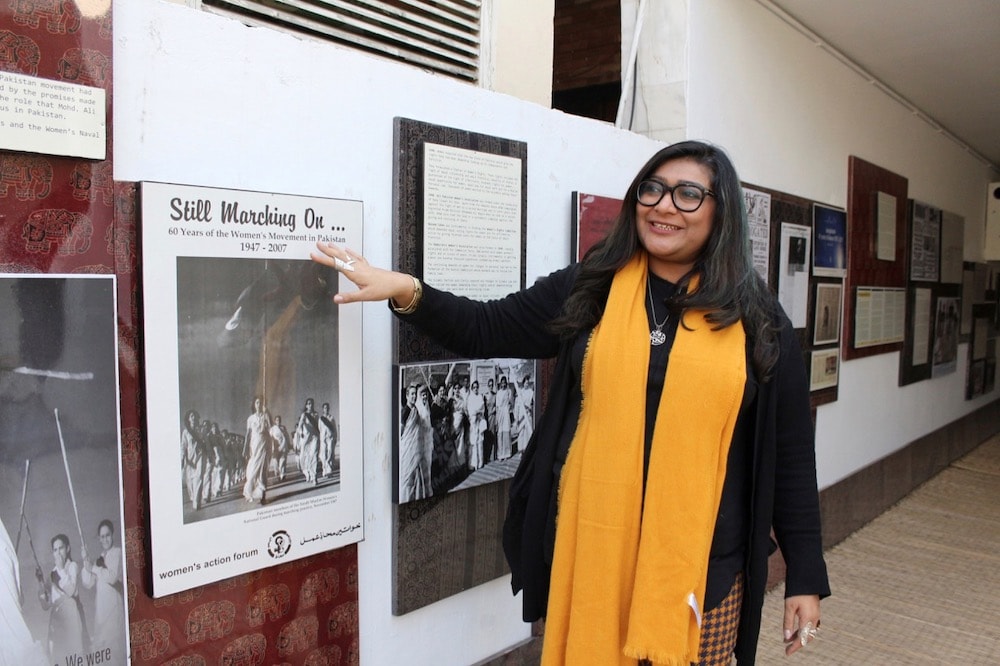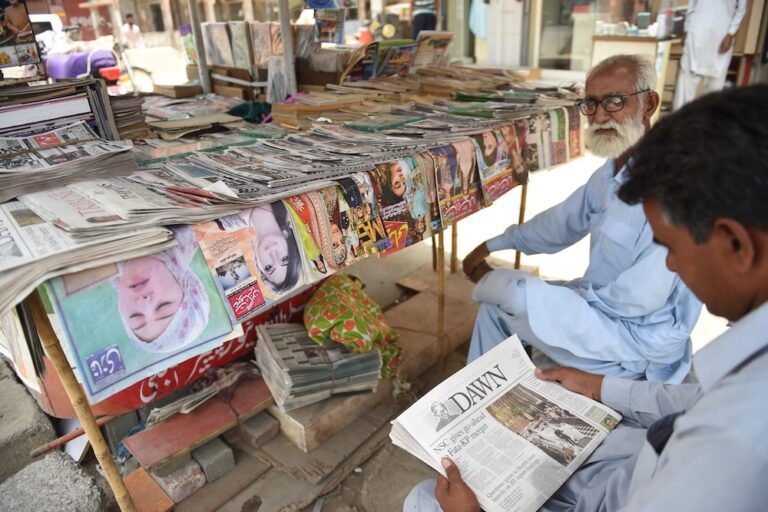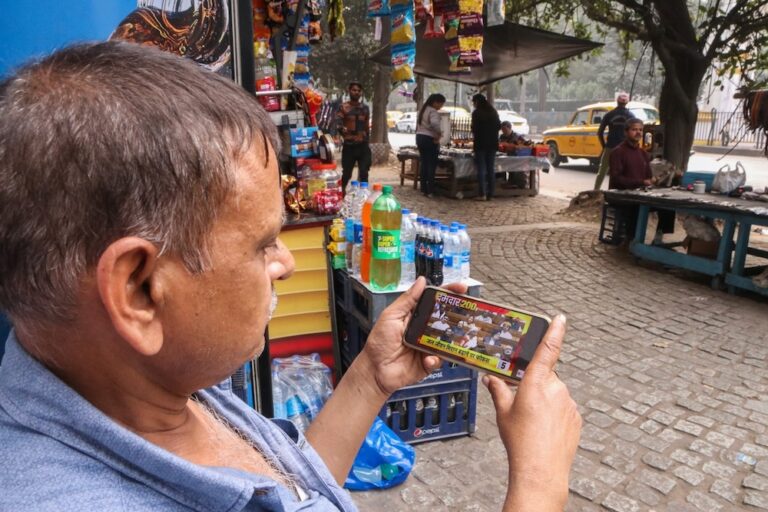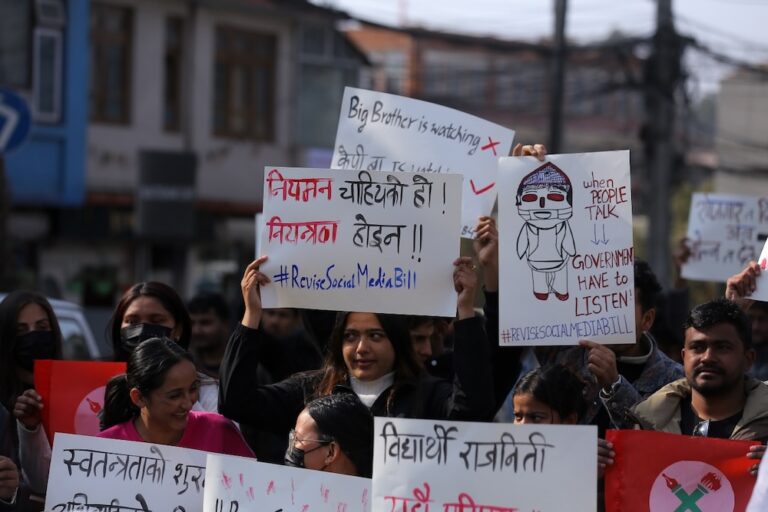February 2023 in Asia-Pacific: A special feature on campaigning for women’s empowerment in Pakistan plus the latest free expression news from the region, produced by IFEX's Regional Editor Mong Palatino.
Promoting women’s digital rights in Pakistan through helplines and e-magazines
Pakistan’s Digital Rights Foundation is a leader in tech-based initiatives, mobilising women to speak out and assert their rights. IFEX asked for their reflections on ever-evolving online threats and campaigning for women’s empowerment in Pakistan.
Digital Rights Foundation has launched several innovative and tech-based initiatives: the Cyber Harassment Helpline, Hamara Internet, Digital 50.50, and a complaint cell for the protection of women journalists.
Amid the polarized political landscape in Pakistan, women face various forms of intimidation, discrimination, and violence. Journalists and human rights defenders who speak truth to power are often targeted with vicious hate campaigns by state-backed forces. The internet initially nurtured a space for women to freely and safely express themselves, but it soon became a hotspot for gender-based threats and attacks.
Among the groups that have been consistently pushing back against misogyny, patriarchy, and online violence is IFEX member Digital Rights Foundation (DRF). It has launched several innovative and tech-based initiatives over the past few years mobilising women to speak out and assert their rights: the Cyber Harassment Helpline, Hamara Internet, Digital 50.50, and a complaint cell for the protection of women journalists. These concrete solutions seek to empower women and make the digital space safer and more inclusive.
“As technology advances, the attacks, disinformation and harassment become more and more sophisticated, and so we need more specific and well-rounded means of tackling these (threats),” said Nighat Dad, DRF’s founder and executive director, in an e-mail interview with this author.
The Cyber Harassment Helpline was established in 2016 to provide legal advice and digital security solutions to the vulnerable segments of the population, especially women and children.
Hamara Internet, which literally means ‘Our Internet’ in Urdu, was launched in 2018 and involved a team of digital defenders who routinely hold online safety workshops throughout Pakistan and run social media awareness campaigns.
Digital 50.50 is a feminist e-magazine which was first released during the pandemic in 2020 “with the aim of creating an open space for ideas, opinions, art, and discourse on a wide array of topics in the digital rights arena from an inter-sectional feminist lens.”
And the newest program, a complaint cell for the protection of women journalists, was initiated through a partnership with the National Commission for Human Rights (NCHR) in July 2022 in response to the increasing cases of harassment against women members of the media.
Reflecting on the impact of these interventions, DRF highlighted the positive response of the community, including authorities.
The helpline, for example, was able to bridge the gap between law enforcement agencies and citizens around online violence complaints. As of December 2022, it has received 14,165 complaints since the hotline was launched. Overall, 60 percent of the calls have been by women and 32 percent by men in the last six years. The popularity of the helpline can be attributed to DRF’s commitment to provide a safe and confidential environment for those who seek guidance and help when faced with any form of online harassment.
DRF’s Dad added that the helpline also promotes mental well-being “because going through an incident of abuse on digital platforms can be very isolating, especially in a conservative environment such as Pakistan, where the victim fears victim blaming leading to restrictions on their normal lifestyle if they confided in anyone.”
After almost three years of publication, Digital 50.50 has commissioned more than 100 original articles from women journalists and has “contributed to a body of knowledge on digital rights in Pakistan from the perspective of women writers.”
“Contributors have also shared that the magazine is a space where journalists can also raise their own stories and challenges from their own perspective and have their voice appreciated,” said Dad, who also pointed out that the magazine provided life-saving income for women writers who lost jobs during the pandemic.
Meanwhile, DRF said it will expand its outreach this year to encourage more women journalists to avail of the complaint cell dedicated to protecting the safety of media personnel. It also noted based on its recent experience that the partnership between an independent state body (NCHR) and a non-profit group can boost the impact of their programs in communities.
“We are working towards a shared goal of protecting the human rights of vulnerable communities and ensuring that the internet is a safe space for everyone,” said Dad.
But like many non-profit groups, DRF is continually seeking resources to sustain its innovative programs. The task can be overwhelming for a team which manages several campaigns at the same time. Despite these challenges, DRF remains highly motivated in promoting women’s empowerment as it offers this important reminder to fellow rights advocates.
“Women in and outside Pakistan have been doing wonderful work around the issues that women across the globe face. However, we do feel that an intersectional approach needs to be taken when talking about the issues that women face, which we believe is somewhat lagging. To promote gender equality it’s important to understand the different layers of challenges that each individual faces; and to make our conversations more intersectional and more inclusive is (also) important,” said Dad.
Stay informed: Visit IFEX’s Gender and Sexual Diversity hub page
February: The Asia Pacific region in brief
Myanmar: Resistance and media resilience
Myanmar citizens marked the second anniversary of the coup on 1 February with a “silent strike” as millions protested the continuing military dictatorship by choosing to stay indoors.
A special briefing was organized by IFEX member International Press Institute, which highlighted the media situation amid the intensified crackdown on critical and dissenting voices. Around 72 journalists are still in detention in various prisons across the country.
Soe Myint, the founding editor-in-chief of IFEX member Mizzima News, spoke about how independent media companies remained defiant by fulfilling their work despite the risks they face.
“Independent media and independent journalists are supposed to disappear, supposed to be killed, and supposed to stop… but two years after, we are able to do more than what we did even before the coup. This is resilience,” said Myint.
Soe Myint was joined by freelance journalist Thin Lei Win in reminding the international community to keep up the pressure on the junta until media freedom and democracy is restored. They also emphasized that supporting the work of independent media is crucial in sustaining global awareness about the pro-democracy movement.
Afghan journalists face continued attacks
Several alarming reports have revealed the further deterioration of the state of media freedom in Afghanistan.
IFEX member Reporters Without Borders (RSF) released a statement signed by 15 French media outlets on 6 February calling for the release of Afghan-French reporter Mortaza Behboudi, who was arrested in January on spying charges. RSF described the freelance journalist’s imprisonment as “truly absurd”.
Tolonews journalist Mohammadyar Majrooh was also arrested but released after five days. Media groups insisted that he should not have been arrested in the first place.
Meanwhile, IFEX member Afghanistan Journalists Center (AFJC) condemned the raid of the privately-owned Tamadon TV by Taliban officers in Kabul on 14 February. Tamadon TV is operated by members of the Hazara ethnic minority, which experienced an escalation of violence after the Taliban regained power in 2021.
AFJC also reported that authorities have ordered the blocking of the Pashto and Dari websites of Voice of America and the website of Azadi Radio. The website blocking was carried out two months after the forced shutdown of these critical broadcast stations.
Aside from harassing journalists, Taliban officials have also made the work of the local media more difficult by banning the taking of photos and videos in Helmand and Parwan provinces. Hardline officials in these provinces claim that photography and the filming of living bodies violate Islam.
Even journalists who fled the country endure new kinds of hardship, which underscores the need to reach out and provide greater assistance to Afghan asylum seekers. IFEX member Index on Censorship shared the testimony of an Afghan woman journalist who found temporary shelter in Pakistan.
“During this period, I have gone through hell – Pakistan is little different to Afghanistan,” said the displaced journalist. “Here too there are Taliban sympathisers. There is no safety, no job opportunities, inflation is high. There is much discrimination, racism and prejudice in the society and there is hostility towards Afghan people in general and women in particular.”
Media pushback and positive updates
A government committee in Nepal under the office of the chief secretary has classified 87 types of information as confidential, which include reports on tax evasion and public procurement among others. Freedom Forum and other advocates of the right to information assailed the decision as a blow to transparency. The government eventually backtracked and withdrew the order.
Wikipedia services were degraded for almost a week in Pakistan upon the orders of the Pakistan Telecommunication Authority (PTA) which accused the online encyclopedia of refusing to remove “sacrilegious” content. The blocking of Wikipedia was widely criticized by students, researchers, and civil society groups, which led Prime Minister Shehbaz Sharif to direct the PTA to immediately reverse its decision. The government also later clarified that moving forward, the PTA should first consult the IT Ministry before banning websites.
Mongolian President Khurelsukh Ukhnaa vetoed a bill intended “to protect human rights on social networks” but would empower authorities to remove social media content that undermine “national unity” and “state secrets”. Even factual reports published by journalists are covered by the bill. RSF lauded the president’s decision as local media groups continue to call for vigilance since the Parliament can override the veto during their next session in March.
In brief: BBC raid, VOD shutdown, Hong Kong security trial
After banning the BBC documentary that featured a report about the controversial role of Indian Prime Minister Narendra Modi in the 2002 Gujarat riots, government tax officials raided the news company’s offices in Delhi and Mumbai. Media groups said the raid aimed to intimidate and harass BBC reporters.
In Cambodia, Prime Minister Hun Sen revoked the license of independent news platform Voice of Democracy (VOD) over a report that allegedly defamed the government. Media and civil society groups have condemned the silencing of a critical news outlet ahead of the coming elections this year. “We believe that the closure of VOD would represent a grave step backwards for both press freedom and the rule of law in Cambodia,” said a statement signed by over 90 groups.
Hong Kong has started the trial of 47 individuals accused of violating national security laws for holding unofficial pre-election primaries in July 2020. Jemimah Steinfeld, editor-in-chief of Index on Censorship magazine, described it as “a show trial masquerading as justice.” It’s the biggest trial in Hong Kong in years but news coverage is limited because of government restrictions.



